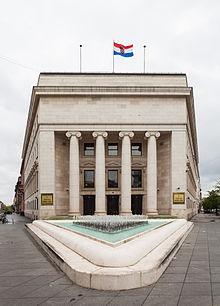Croatian National Bank
The Croatian National Bank ( Croatian Hrvatska Narodna banka ), HNB for short, is the central bank of the Republic of Croatia based in the Croatian capital Zagreb . It is a member of the European System of Central Banks .
The National Bank was established in 1990 by the Law on the Croatian National Bank and the Croatian Parliament . It is headed by the governor ( guverner ) of the bank. In July 2000 Željko Rohatinski became governor of the HNB. The governor has been Boris Vujčić since 2012 .
The main objectives of the bank are to maintain price stability and support the economic policy of the Croatian government . It administers the national currency kuna , issues themed banknotes and coins and holds the national currency reserves .
Monetary policy
One of the tasks of the Croatian National Bank is the formulation and execution of monetary and exchange rate policy. For the purpose of achieving the formulated currency and exchange rate policy, the HNB can take measures to regulate lending activities and the liquidity of the banks, to regulate the amount of money and to regulate the interest and exchange rates of the domestic currency.
The HNB is authorized to regulate subordinate legislation and other decrees for foreign exchange transactions of legal and natural persons and to carry out foreign exchange transactions in the Republic of Croatia. The Croatian National Bank is also authorized to take measures to fix the value of the kuna against other currencies.
The Croatian National Bank can issue its own securities in domestic or foreign currency, give consent to buy, sell and swap securities, as well as decide on other marketable financial instruments and rights and obligations associated with them. The Croatian National Bank is allowed to grant loans to solvent banks that are domiciled in the Republic of Croatia for a maximum of six months. In order to ensure that the loan can be reclaimed, financial instruments are used in accordance with the HNB law. Bonds issued by the Croatian National Bank or the Republic of Croatia and payable in the Republic of Croatia are part of a public bond that is stipulated by the HNB Act.
The interest rates for balances and loans at the Croatian National Bank have been determined in a separate decision of the Croatian National Bank. The Croatian National Bank is obliged to let the banks set aside the minimum reserve. The minimum reserve is defined as a percentage in relation to the type, duration, size and increase in deposits and other liabilities. The HNB can decide to reward banks for putting back the minimum reserve. The amount of the remuneration paid is determined by the HNB.
Web links
Individual evidence
- ↑ Monetary and foreign exchange policies hnb.hr, accessed on: May 7, 2010
